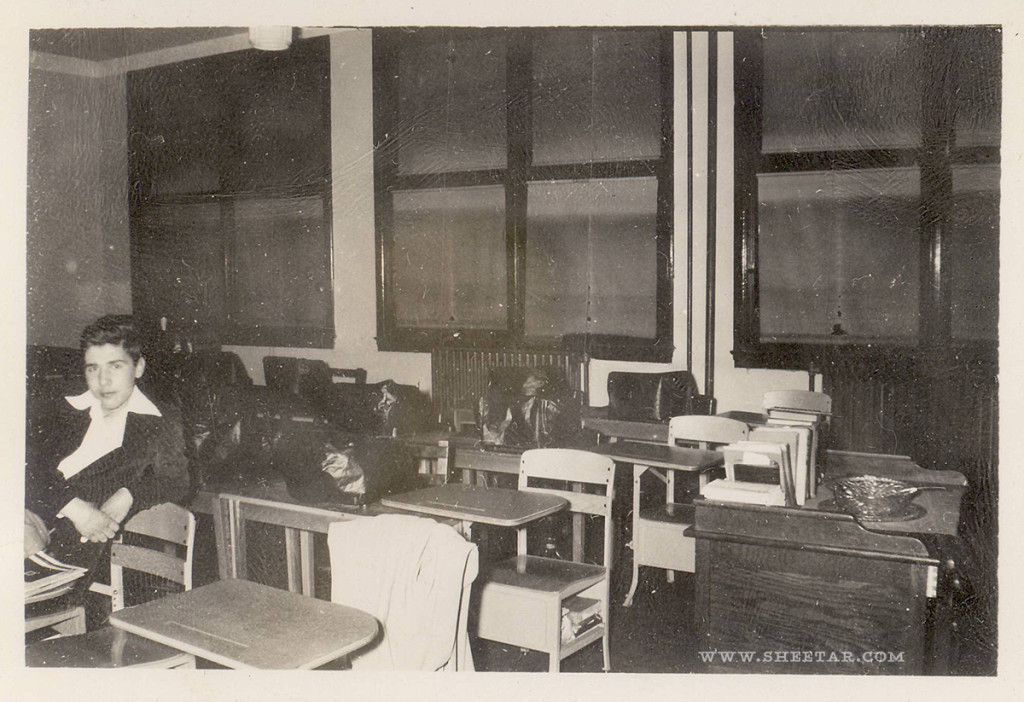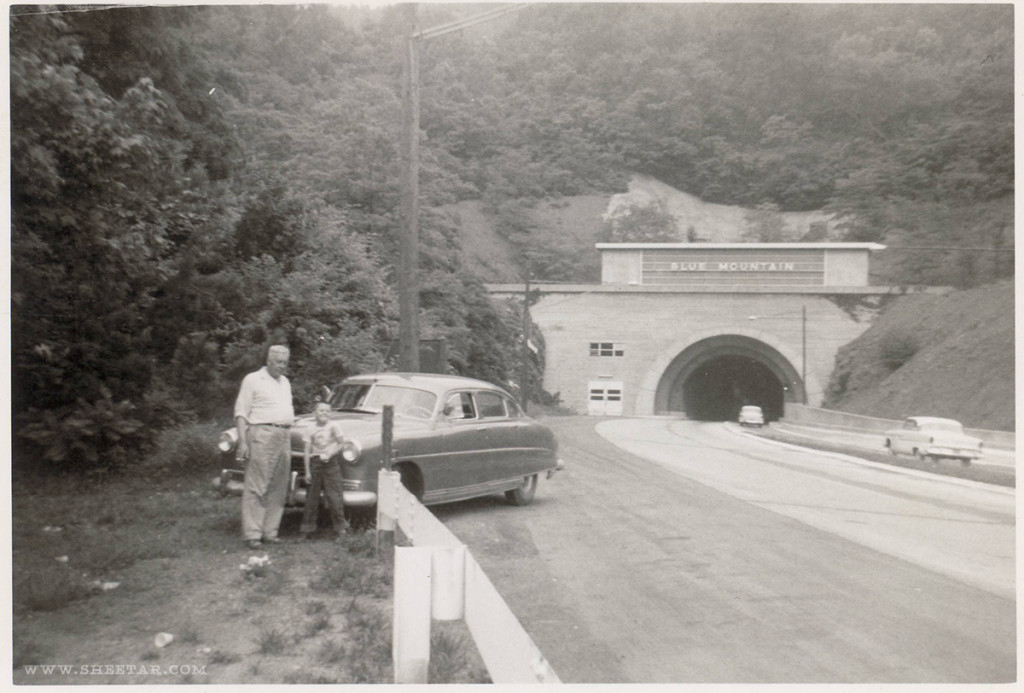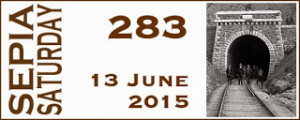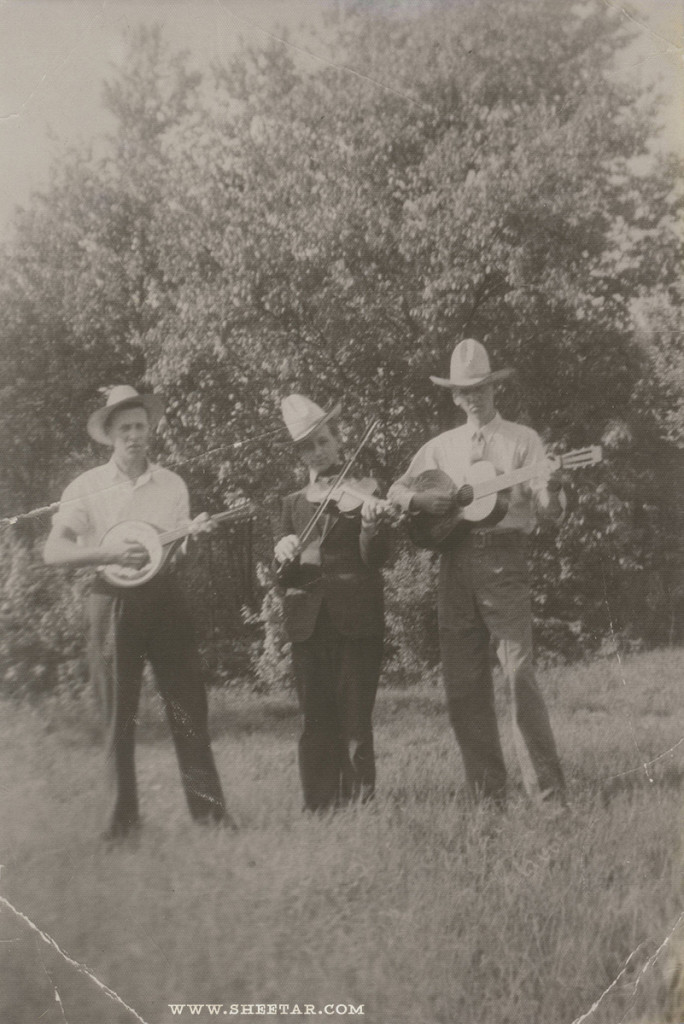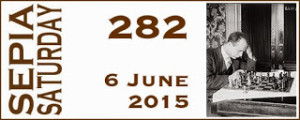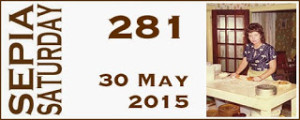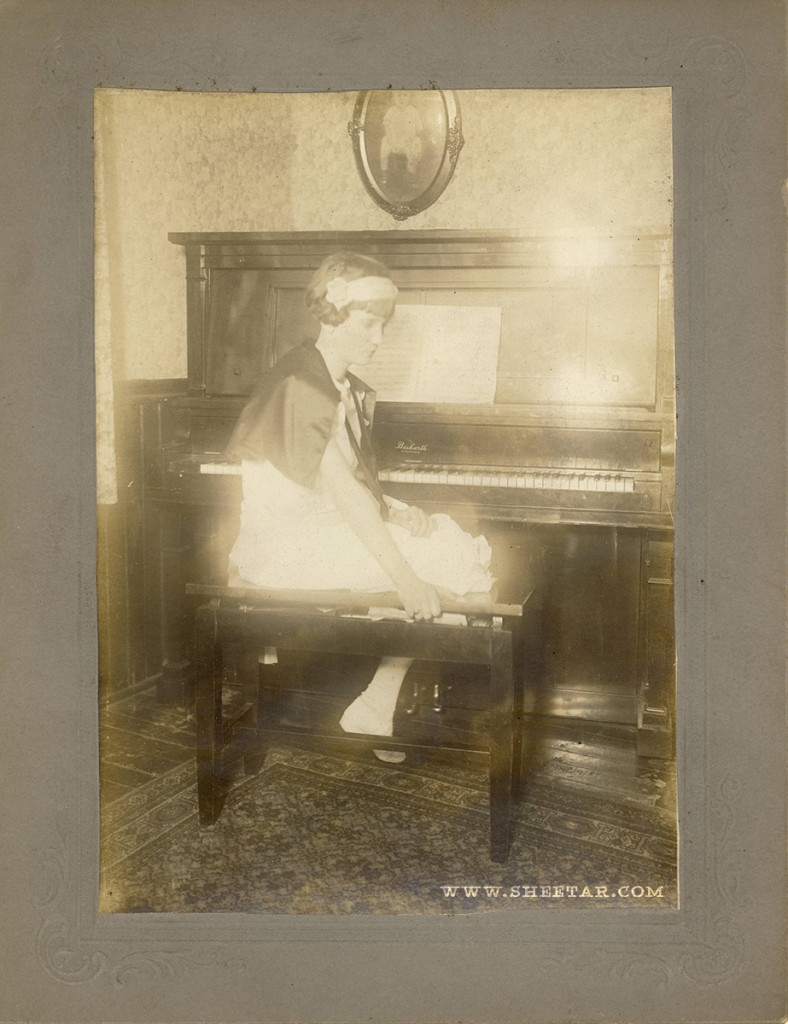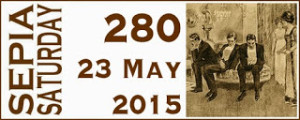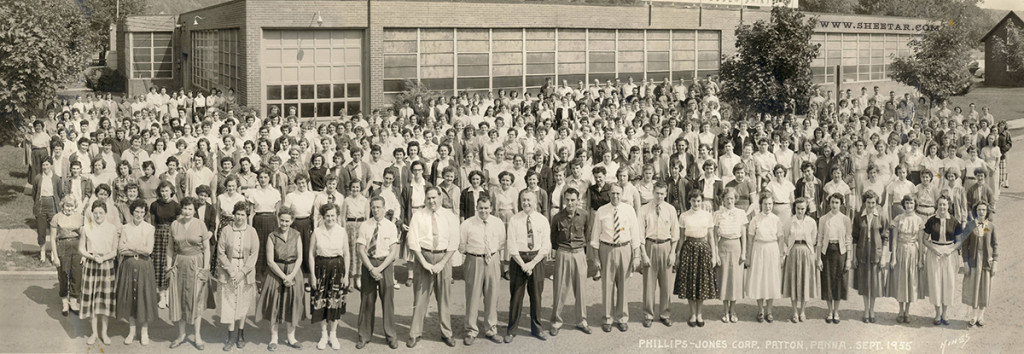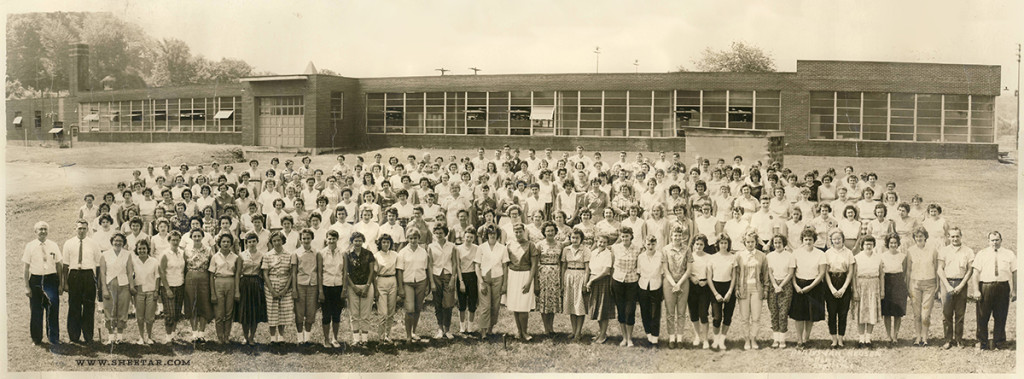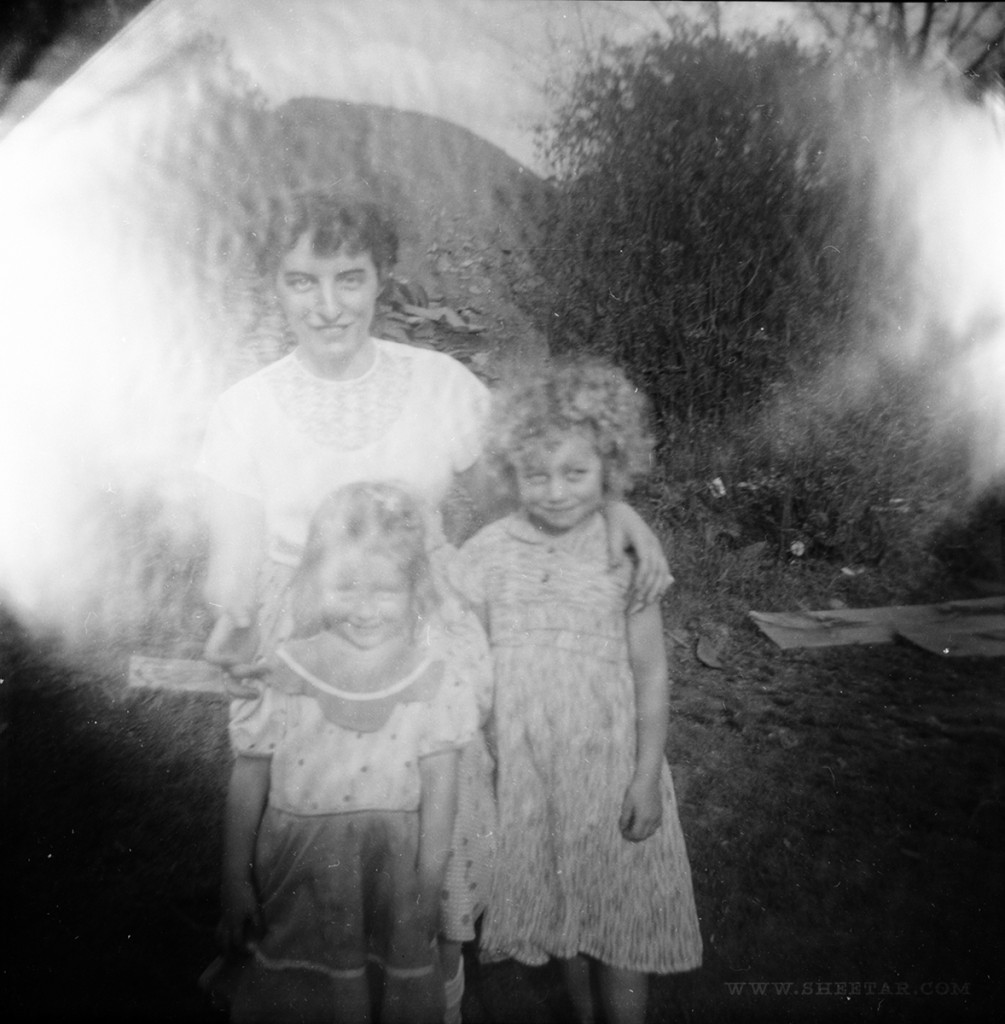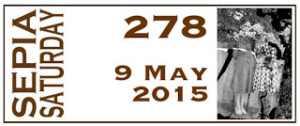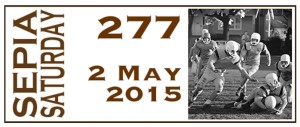Another Sepia Saturday gets written, or typed, into the books! It took me a few seconds to think of a photo that might have typewriters in it, and in case it wasn’t obvious at first, the photo above fits the bill. The photo is of a classroom, presumably at the Beccaria-Coalport-Irvona High School in 1951. On the desks? Typewriters in their dust covers! There are a series of photos presumably taken around the time my grandpa, Leon Kitko, graduated high school, and this fits the size/theme of the others. I can’t be 100% positive since there’s no date or label, but I’d call it 99.9% likely. Grandpa happened to save his high school yearbook, so I took a peek through to see if I could identify the student. He appears to be John Finch. The class was pretty small – they graduated only 50 in 1951 – so it’s pretty easy to pick out who’s who. I have no information about him and it’s too common of a name to sort out what’s he’s up to now. All I can find is a census record that has him living in Gulich, Clearfield County, PA in 1940 which fits with the John Finch who’s in this photo as far as location goes. Beyond that, I can’t find anything in newspaper searches or anything else. Perhaps though, one of his descendants may stumble upon this page and find the photo.
Category: Sepia Saturday
Sepia Saturday 283: Tunnel, Construction, Dates
I’m keeping Sepia Saturday short and sweet this week. Things this summer have been so incredibly busy, and I’ve been just barely getting these posts up every week – I’m still getting it done, but it’s typically last minute! Here we have a photo of Earl Powis and his second son standing in front of the entrance to the Blue Mountain Tunnel on the Pennsylvania Turnpike. At the time, probably around 1955, it was one of seven tunnels on the turnpike that worked their way under the mountains of Pennsylvania. The photo looks just about exactly like this postcard and a better history of the turnpike and its tunnels can be found online here. Not long after these gents took this photo, three of the tunnels were bypassed and closed. A little later on, this tunnel as well as the remaining tunnels in the system were “twinned” which added a second tunnel and set of roadways making two lanes of travel in each direction. I know I’ve been through this particular tunnel in recent history, and it’s the eastern-most tunnel on the system. While it’s not quite as old as the tunnel in the prompt photo, this was the first one I thought of when I saw the image for this week.
Sepia Saturday 282: Chess, Games, Musicians
This week’s Sepia Saturday prompt image brought us Mischa Elman, a famous violinist, playing chess which opened up a variety of theme ideas from chess to games and musicians. Sadly, I have no family photos of chess being played, but we have plenty of musicians! On the left in the photo above is my grandfather, John Rachocki (1914-1984). It’s a rare chance that I get to showcase a photo from my maternal side of the family since we have so few, so I jumped at the opportunity to include this one. Grandpa John, the son of Polish immigrants, stood nearly 6 feet tall, and everyone who’s spoken about him (he died when I was just four years old), has said he was a gentle giant with a quiet demeanor. He served in World War II, worked in the coal mines, and even worked for a while as a nurse and security guard at a local mental hospital in Pennsylvania. A living family member spoke about him recently and said that he played the mandolin brilliantly, but with such large hands, it was a wonder how he managed to play such a delicate instrument so well. I’m not sure who the other two men are, but the hats are certainly interesting for central Pennsylvania. As far as a date, I’d probably say around 1945 or so. It’s really a treasured photo, one of I think only two we have of Grandpa John with his mandolin, and I’m happy to have had the chance to show it off for Sepia Saturday.
Sepia Saturday 281: Kitchens, Pies, Color Slides
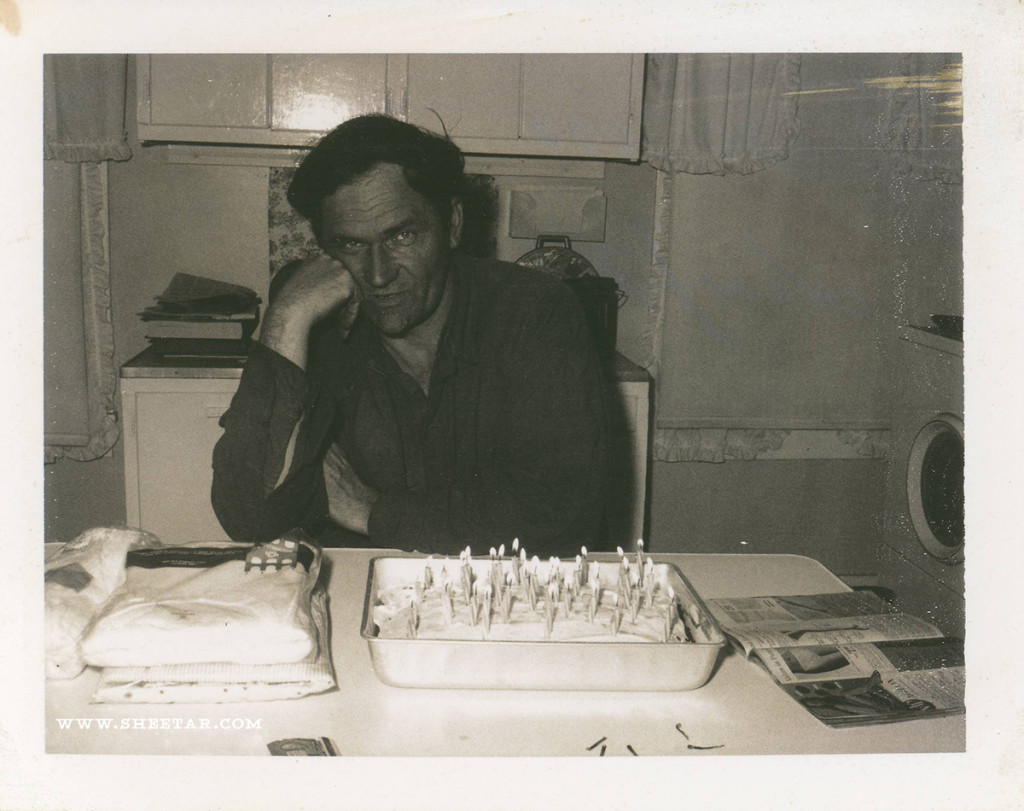
There were a couple of different directions to go this week for Sepia Saturday, so I chose two that fit pretty well. The above photo was taken on peel-apart Polaroid film on March 20, 1970 and is of my grandfather, Leon Kitko. Why such a specific date? It was his 37th birthday. I’m not sure there are exactly 37 candles on that cake, but there certainly are quite a few! He’s also got a package of socks and t-shirts on the table, presumably his practical birthday gifts. There’s an open magazine on the table next to a pile of spent matches and a matcbook. I can only imagine it took at least that many matches to light so many candles. There are quite a few photos similar to this one and it appears that grandma took special care to bake a cake and have a little celebration for his birthday every year.
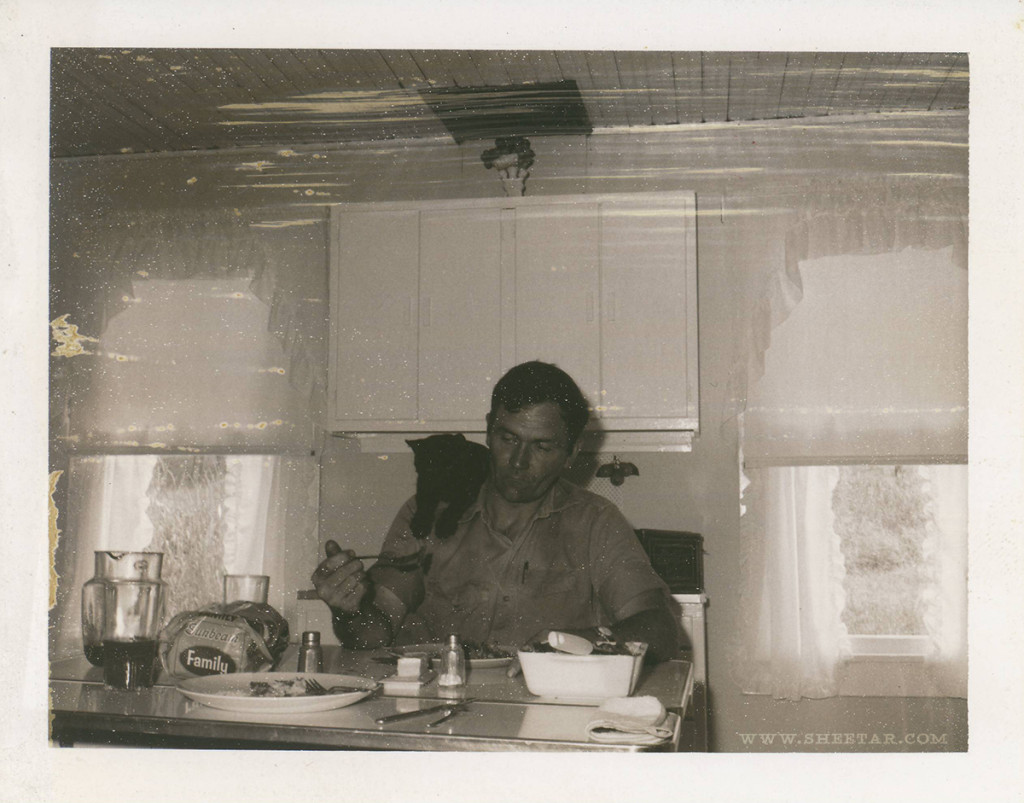 Grandma and grandpa were both animal lovers, and here we have a photo of Ed the cat perched on Leon’s shoulder while he lifts a fork to the cat. The date on the back is July 2, 1968, and there are a few photos of Ed in just the same position. I’m told this particular cat just wanted to eat at the table with you and was happy to sit on Leon’s shoulder during any meal. Pretty funny. I suppose I need to apply for bonus points this week since I have a post that is both appropriate for Sepia Saturday and Caturday.
Grandma and grandpa were both animal lovers, and here we have a photo of Ed the cat perched on Leon’s shoulder while he lifts a fork to the cat. The date on the back is July 2, 1968, and there are a few photos of Ed in just the same position. I’m told this particular cat just wanted to eat at the table with you and was happy to sit on Leon’s shoulder during any meal. Pretty funny. I suppose I need to apply for bonus points this week since I have a post that is both appropriate for Sepia Saturday and Caturday.
Sepia Saturday 280: Boys, Girls, Reverses
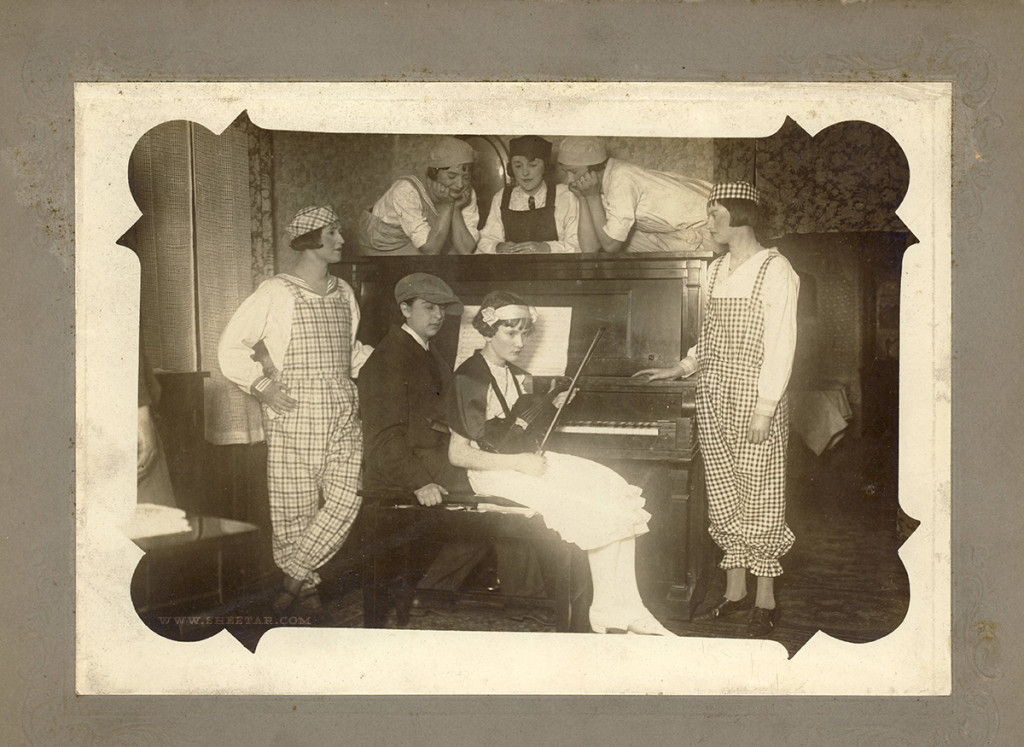 For this week’s Sepia Saturday theme, the prompt image reminded me immediately of this set of photos. While the prompt image clearly shows a group of women taking on the traditional role of men and vice versa, the images here are not clearly about mixing roles, but there appears to be some non-traditional costuming and casting going on. It’s clearly of some sort of theatrical production, though I have no idea what exactly the play/theme was. The two people standing on either side of the piano appear to be male even though they’re done up with cute bob haircuts (wigs maybe?) and makeup. The three on the top of the piano are in similar overalls (one even with a tie) yet appear to be girls (note the rings on the left ring finger of all of them). Even the boy on the piano bench in the cap may be a girl, and it’s possible that the girl with the violin may be a boy – it’s awfully hard to tell!
For this week’s Sepia Saturday theme, the prompt image reminded me immediately of this set of photos. While the prompt image clearly shows a group of women taking on the traditional role of men and vice versa, the images here are not clearly about mixing roles, but there appears to be some non-traditional costuming and casting going on. It’s clearly of some sort of theatrical production, though I have no idea what exactly the play/theme was. The two people standing on either side of the piano appear to be male even though they’re done up with cute bob haircuts (wigs maybe?) and makeup. The three on the top of the piano are in similar overalls (one even with a tie) yet appear to be girls (note the rings on the left ring finger of all of them). Even the boy on the piano bench in the cap may be a girl, and it’s possible that the girl with the violin may be a boy – it’s awfully hard to tell!
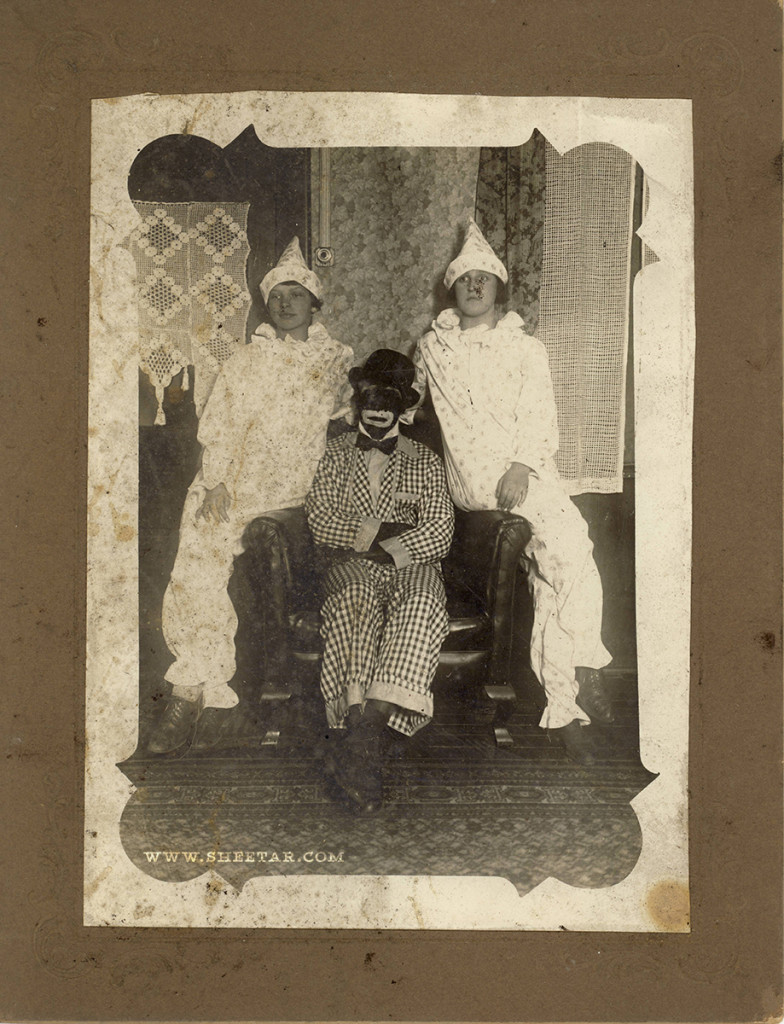
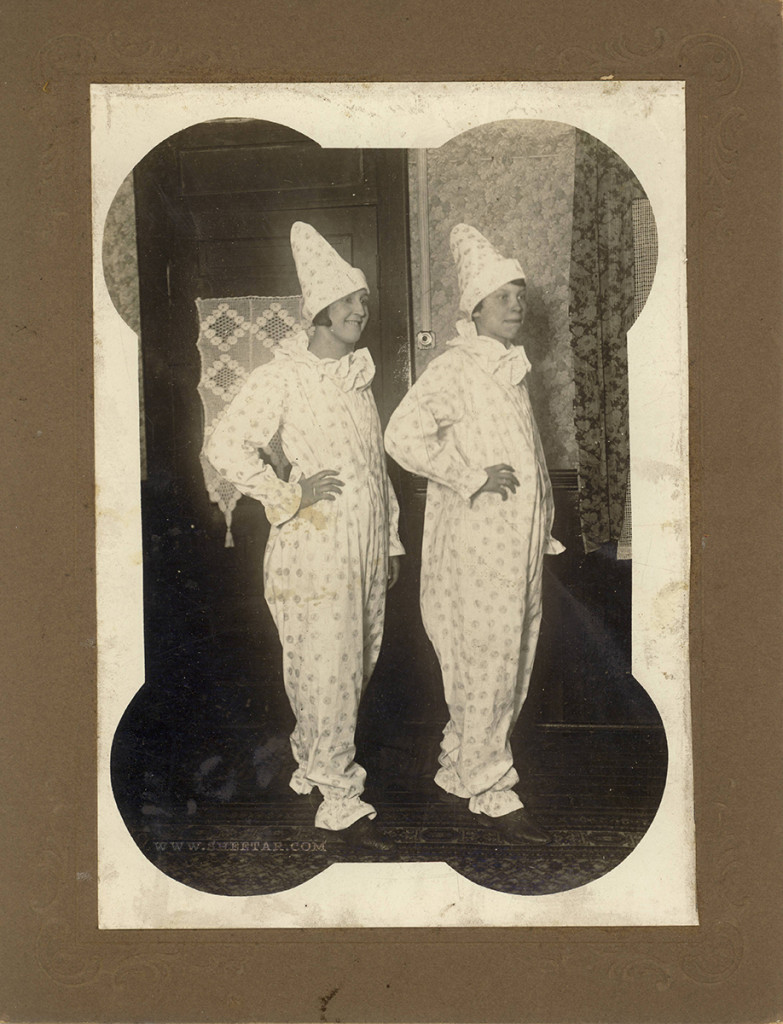
Sepia Saturday 279: Safety, Danger, Industry
While I have plenty of photos of the coal industry for this Sepia Saturday, I thought this would be a great chance to explore a ‘cleaner’ industry through three photos of factory workers. Two of my grandmothers (biological and step) worked in various sewing factories over the years. Rolled up in paper tubes, I found these great panoramic photos of the factory staff – they were a little bit of a trouble to scan and piece together (three scans for each, then stitched up in photoshop), but the result is worth it! All three were taken in the 50s and 60s at the Phillips-Jones (Van Heusen) Corp in Patton, PA. The first one is labelled as being taken in September 1955. In that particular photo, both grandmothers are present! In fact, my biological grandma is about 6 months pregnant with my father at that point. The second photo has no date but may have been taken prior to 1955, best guess, since my step-grandma looks younger in that one. However, I had found a written work history that Romayne (Greenaway) Kitko compiled at some point in her life. She lists having worked at the Van Heusen Co of Patton, PA from 1955-1966. The last photo is dated September 1961 (very faintly, in white), at the same location. It’s interesting that they took a sort of ‘class photo’ for every year at the factory. I have to imagine that this was in part to boost employee morale by making everyone feel like they were part of a large team, and in part to show off at headquarters.
The Phillips-Jones company eventually became the Van Heusen company we know today. Here’s a good link containing more information on the history of the company. The factory employed many women during a time when women were just starting to go to work right after World War II. You can see the company was still run by the men standing up front, but women were in the workplace, in a factory even. There’s a wide age range to the women in the photos too – from young gals straight out of high school to women who look to be in their 60s and 70s. They appear to be of differing ethnicities, but I couldn’t find a single black woman in any of the groups. Whether that was purposeful discrimination or just the fact that the region was largely caucasian, I can’t be sure.
I found a great newspaper article detailing a little history of the plant. It was built in 1947 and employed 250 people. After the expansion (article dated i1954) which you can see in the third photo on the right and left of the original building, they planned to employ over 400 people, mostly women. While the article was dated 1954, the plant either underwent another expansion after that for the 1961 photo or the second photo was on or after 1954. The trees appear to be smaller, but not by much, so it has to be slightly earlier than the first photo, but the buildings appear the same. I’m not sure exactly when the factory ceased operation, but another company was in the same location by 1994, so it was well before then. You can click any of the above photos to see a larger version, but as for me, I’m working industriously towards the next Sepia Saturday.
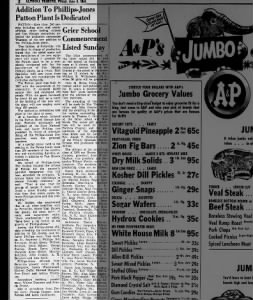
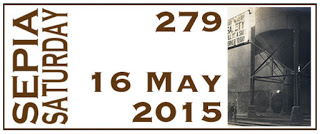
Sepia Saturday 278: Decayed and Damaged Photographs
Still on theme for this Sepia Saturday, but I went with damaged negatives instead of photos! Afterall, the photos are made from negatives, so in the long run, it works out. These negatives are square format and were subject to some kind of light leak, likey while inside the camera since there are a series of photos with evidence of the same light leak in the same spots. The photos are of Romayne (Greenaway) Kitko (1936-2013), my grandfather’s second wife. While we were going through yet another trunk of photos, we found an old paper photo sleeve stuffed full of negatives. Being the preservation nerd of the family, I grabbed them up and scanned them, because you just never know what you’ll find. I’m still using a super old scanner, the Canon Canoscan 8400F because it comes with negative carriers for the most popular film types (except for 127 film), and it gets the job done. Unfortunately, damage like this is just impossible to undo – the negative was overexposed from the light leak and it’s not possible to reconstruct data that isn’t there or was blown out by the light leak. There’s also a little bit of dust/scratches and other damage from age and being improperly stored for so long.
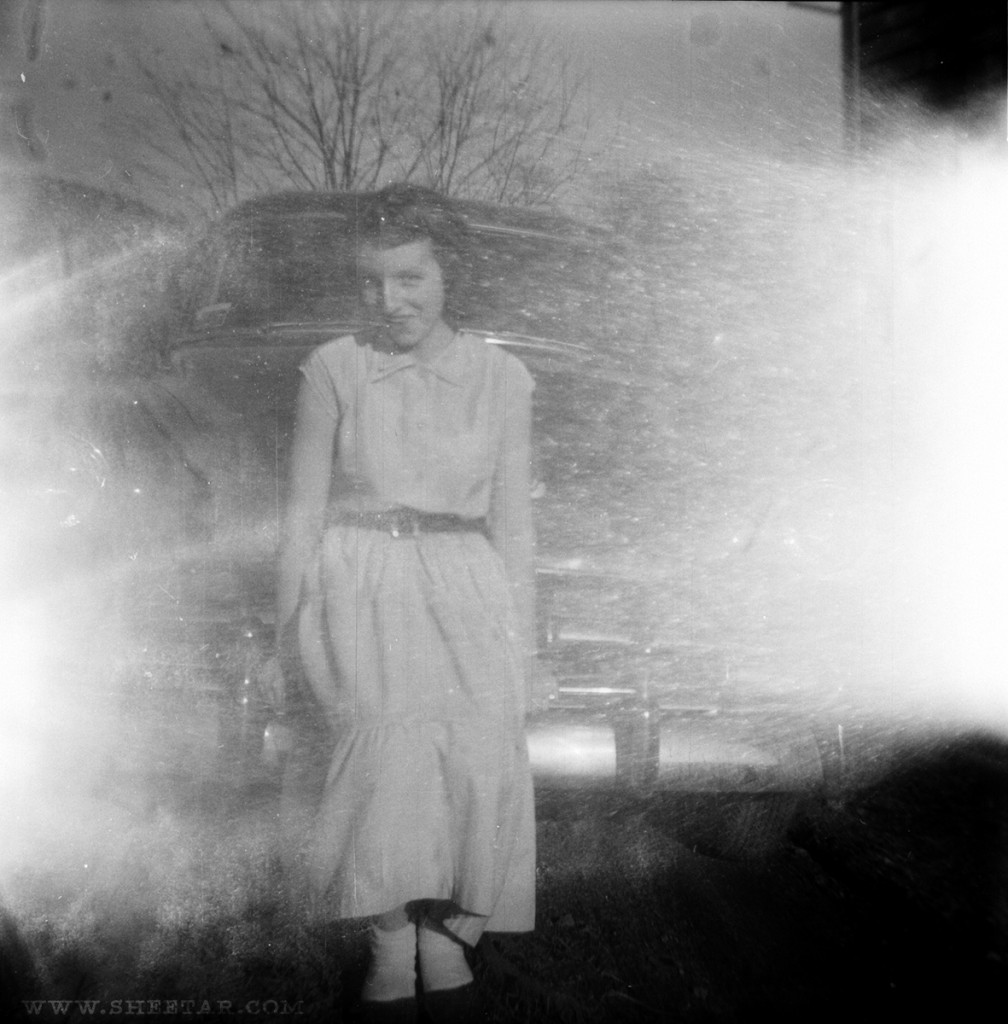
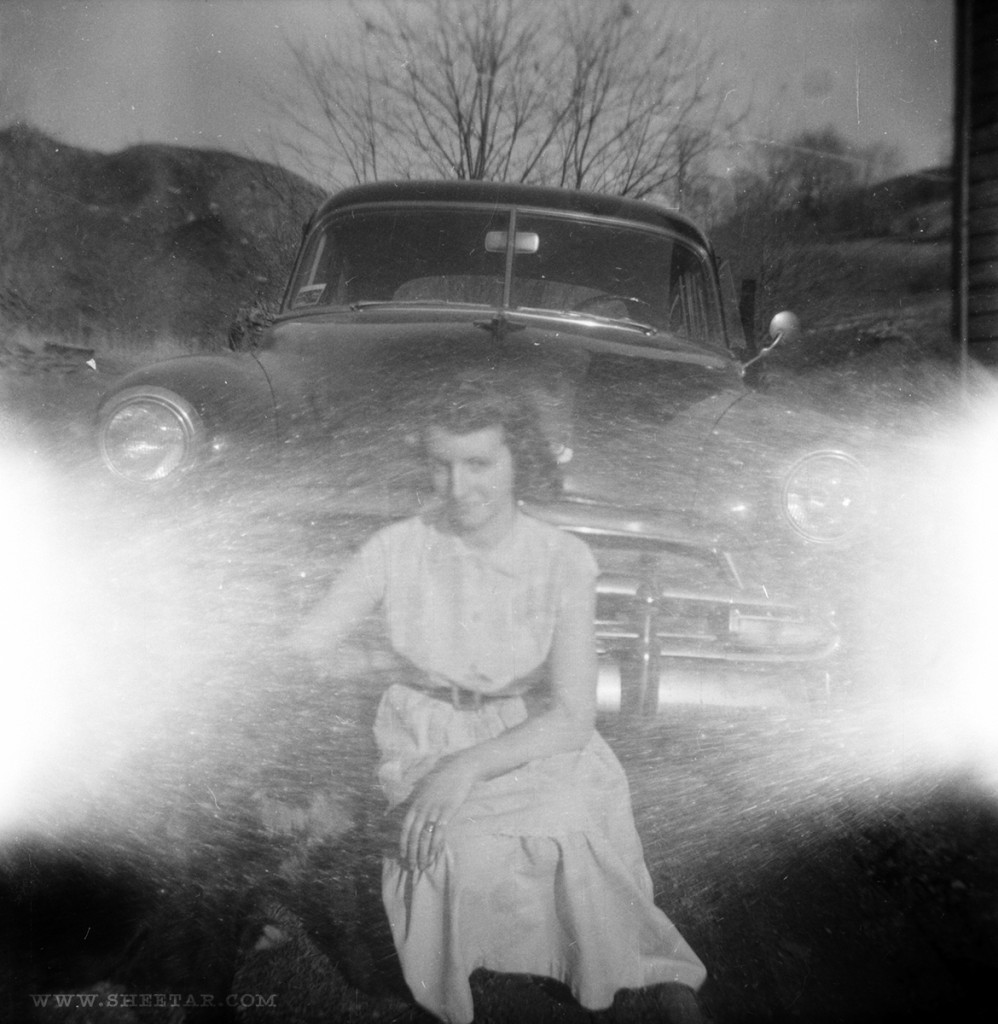
Sepia Saturday 277: Sport, Football, Action
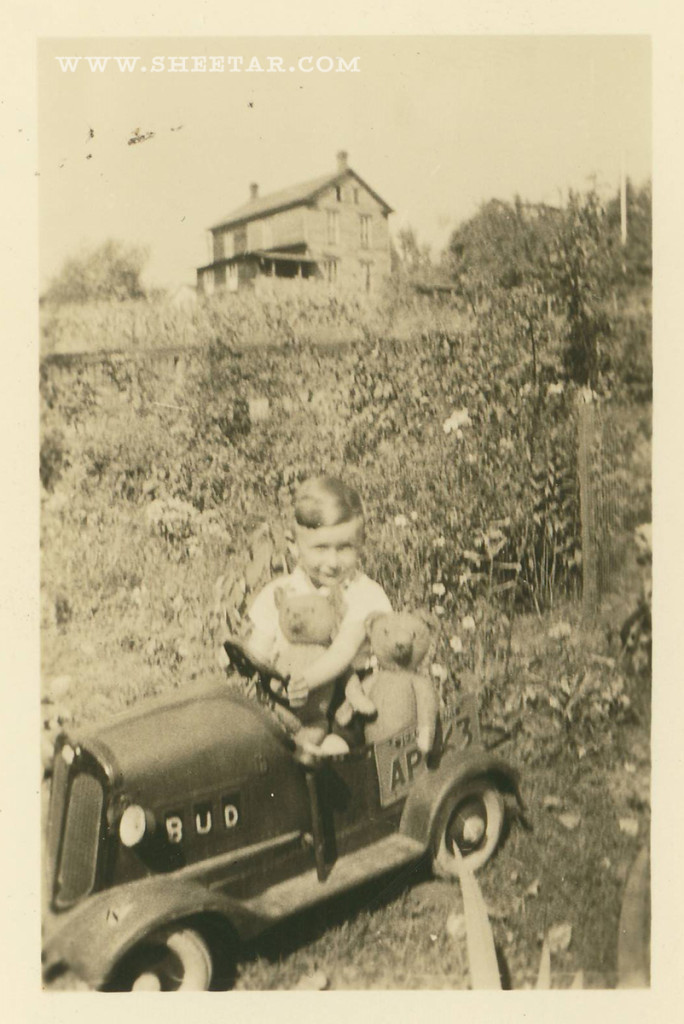
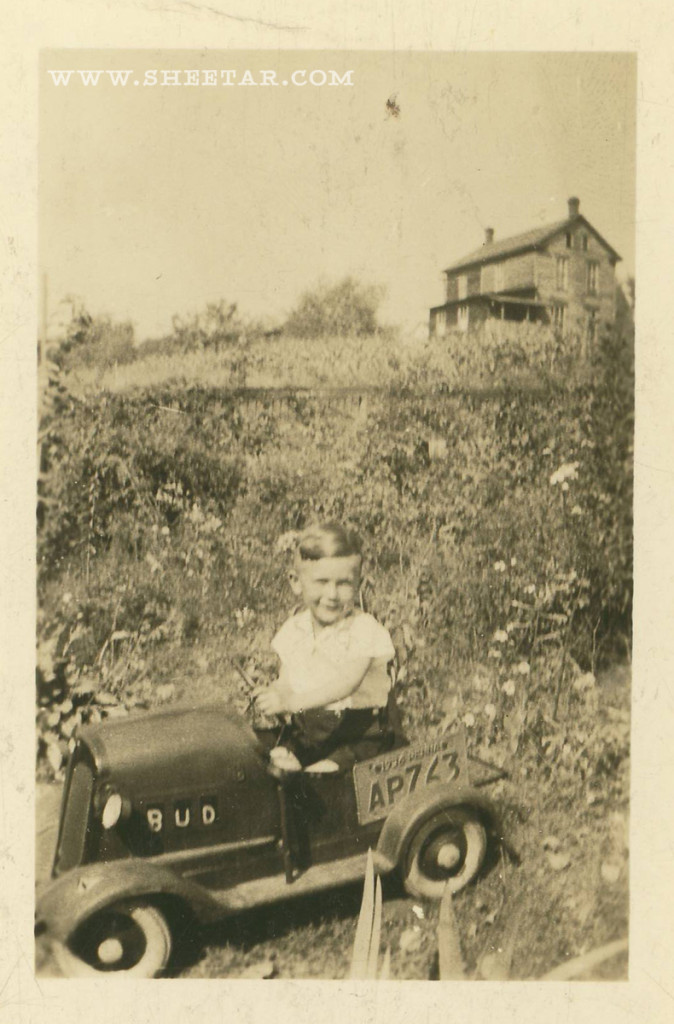
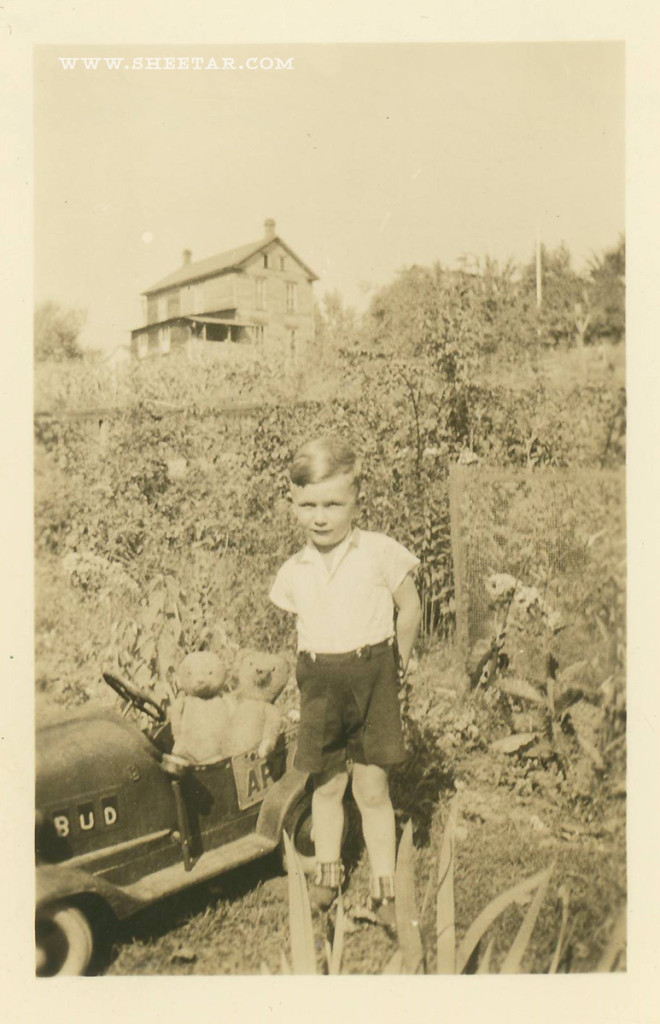
It’s a darling set of photos taken in the yard at the house where he grew up. While he’s not in a football uniform or tackling anyone, he’s a young boy playing with his teddy bears and I think that plays into the theme fairly nicely!

